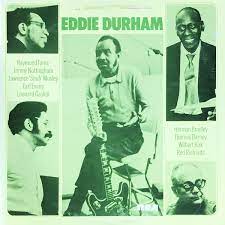
Daily Dose Of Jazz…
Edward Durham was born on August 19, 1906 in San Marcos, Texas to Joseph Durham, Sr., and Luella Rabb Durham. From an early age he performed with his family in the Durham Brothers Band. At the age of eighteen, he began traveling and playing in regional bands.
From 1929 Eddie started experimenting to enhance the sound of his guitar using resonators and megaphones. In 1935 he was the first to record an electrically amplified guitar with Jimmie Lunceford in Hittin’ the Bottle that was recorded in New York for Decca.
In 1938, Durham wrote I Don’t Want To Set The World On Fire with Bennie Benjamin, Sol Marcus, and Eddie Seiler. During the 1940s he created Eddie Durham’s All-Star Girl Orchestra, an all black female swing band that toured the United States and Canada.
That same year Eddie recorded single string electric guitar solos with the Kansas City Five or Six, which were both smallish groups that included members of Count Basie’s rhythm section along with the tenor saxophone playing of Lester Young. The orchestras of Bennie Moten, Jimmie Lunceford, Count Basie and Glenn Miller took great benefit from his composing and arranging skill.
Guitarist, trombonist, composer and arranger Eddie Durham, who was one of the pioneers of the electric guitar in jazz, transitioned on March 6, 1987.
More Posts: arranger,guitar,history,instrumental,jazz,music,trombone
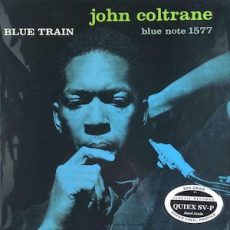
Requisites
Blue Train ~ John Coltrane | By Eddie Carter
John Coltrane steps into the spotlight for this morning’s discussion with his only release for Alfred Lion’s label, Blue Train (Blue Note BLP 1577/BST 81577). It was recorded in 1957 and released a year later, has stood the test of time, and is considered one of the essential records to own in the tenor saxophonist’s discography. Blue Train is his third album as a leader and also highlights his compositions, he wrote four of the five selections and personally picked the musicians who accompany him on this date. Lee Morgan on trumpet, Curtis Fuller on trombone, Kenny Drew on piano, Paul Chambers on bass, and “Philly” Joe Jones on drums round out the sextet. My copy used in this report is the Classic Records Mono audiophile reissue sharing the original catalog number.
Side One leaves the station with Blue Train, a mid tempo blues that the sextet sets in motion to an easy-going beat. John soars effortlessly through the rhythm section in the first solo. Lee follows with a happy, relaxed groove, then Curtis gives a perfectly crafted, full-toned reading. Kenny shapes the next statement with some bluesy dialogue and Paul covers plenty of ground in the finale preceding the ensemble’s reprise and climax. Moment’s Notice is next and it’s ablaze from the start of the melody. Coltrane takes the lead with a pulse-quickening performance. Fuller comes in for an energetic excursion next, then Morgan swings vibrantly into the third reading. Chambers goes for a short walk and Drew gets a scintillating presentation on the closer leading to the ending theme.
Locomotion speeds down the track to begin Side Two and the sextet gives the uptempo melody a workout. John takes a swift run on the opening solo; next Curtis jumps into the second reading aggressively, then Lee follows with a stunning showpiece. Kenny raises the energy level of the following interpretation. Philly closes the proceedings on a few fiery phrases before the sextet takes it out. I’m Old Fashioned by Jerome Kern and Johnny Mercer starts with a tender melody by Coltrane who continues caressing the first solo with sultry notes. Fuller brings out breathtaking beauty in the next statement. Drew compliments them with sincere elegance subtly supported by Chambers and Jones. Morgan closes with a great delicacy that’s beautifully executed.
The sextet steps back into high gear on Lazy Bird with a nimble opening chorus. Lee leads the charge with electric energy. Curtis follows with fiery passion on the second statement, then John swings with fierce intensity. Kenny tears into the next reading enthusiastically, next Paul does a brief bit of bass walking. “Philly” adds a fitting closer with an exhilarating drum solo ahead of the ensemble’s finish. Blue Train was originally produced by Alfred Lion, and Rudy Van Gelder was the recording engineer. Bernie Grundman mastered the album from the original analog tapes. This reissue was pressed on 200-gram Quiex SV-P audiophile vinyl. The sound quality is sensational with a superb soundstage that’s a sonic treat, and the record is absolutely quiet until the music starts. If you like jazz, I can’t think of a better choice for your library than Blue Train by John Coltrane. The album is a bona fide classic that you can enjoy endlessly and a must-have for any jazz fan!
~ I’m Old Fashioned – Source: JazzStandards.com © 2022 by Edward Thomas Carter
More Posts: choice,classic,collectible,collector,history,instrumental,jazz,music,saxophone
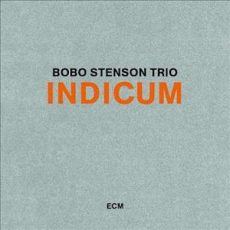
Daily Dose Of Jazz…
Bobo Stenson was born Bo Gustav Stenson on August 4, 1944 in Västerås, Sweden. Starting at the age of 8 he studied with Werner Wolf for 15 years. In 1963, he stepped up from the local scene in his hometown to begin playing frequently in Stockholm. There he accompanied a long line of visiting American players including Sonny Rollins, Stan Getz and Gary Burton. He worked closely with Don Cherry from the beginning of the trumpeter’s residency in Scandinavia.
The 1970s was an intensive period for Stenson, playing in many groups, amongst them the long-standing band Rena Rama with Palle Danielsson, and a trio with Arild Andersen and Jon Christensen. He would later work with Jan Garbarek.
In 1988, he joined the Charles Lloyd quartet and since 1996 has appeared at major jazz festivals with Tomasz Stańko’s septet/sextet. Pianist Bobo Stenson continues to perform to this day.
More Posts: bandleader,history,instrumental,jazz,music,piano
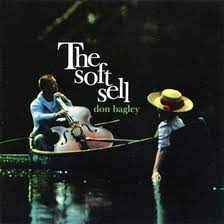
Daily Dose Of Jazz…
Donald Neff Bagley was born on July 18, 1927 in Salt Lake City, Utah and received formal training on the double bass. He went on to study in Los Angeles, California and played in 1945 with Shorty Sherock and Wingy Manone, and in 1948 with Dick Pierce.
During the early Fifties from 1950 to 1953, and sporadically thereafter, Bagley played with Stan Kenton. HIs time with Kenton, A Study for Bass by Bill Russo and Bags by Bill Holman were written to feature Bagley’s playing. By 1954 he was fronting his own ensembles. His session work between 1950 and 1952, Don worked extensively with Nat King Cole, Maynard Ferguson, and Dexter Gordon. He played in Europe with Zoot Sims, Lars Gullin, Frank Rosolino, and Åke Persson. He would go on to work with Les Brown, Jimmie Rowles, Shelly Manne, Pete Fountain and Phil Woods. In 1957 and 1958, he recorded three albums under his own name.
The Sixties saw him playing with Ben Webster and Julie London. Into the 1970s and 1980s he worked with Burt Bacharach while composing and arranging for film and television, including the scores to Mama’s Dirty Girls, The Manhandlers, The Swinging Barmaids, The Student Body, Young Lady Chatterley and Sacred Ground.
Double bassist, composer and arranger Don Bagley transitioned of natural causes on July 26, 2012 at the age of 85.
More Posts: arranger,bandleader,bass,composer,history,instrumental,jazz,music
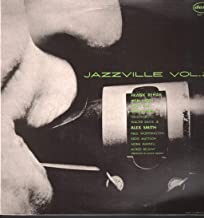
Daily Dose Of Jazz…
Frank Rehak was born July 6, 1926 in New York City and began on piano and cello before switching to trombone. He worked with Gil Evans and Miles Davis. He also appeared with Davis on the broadcast The Sounds of Miles Davis.
A heroin addiction combined with other financial problems led to his withdrawal from music and his lapsing into relative obscurity. It was probably partially contributed to his failed marriage to nightclub dancer Jerri Gray. In an effort to deal with these issues he spent time at Synanon, which led to his mention in Art Pepper’s autobiography.
Trombonist Frank Rehak transitioned in Badger, California on June 22, 1987 of throat cancer at the age of 60.
More Posts: history,instrumental,jazz,music,trombone




